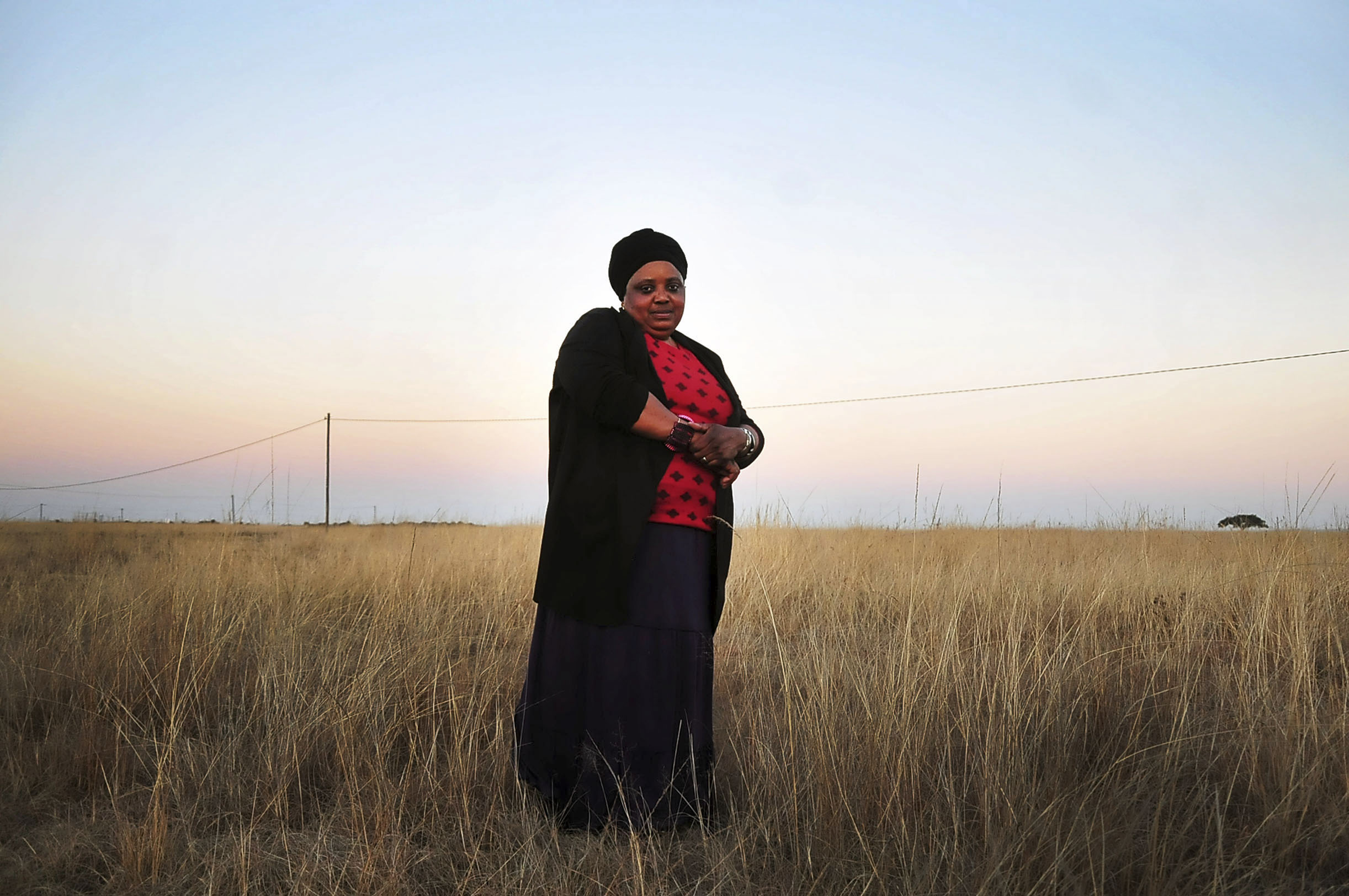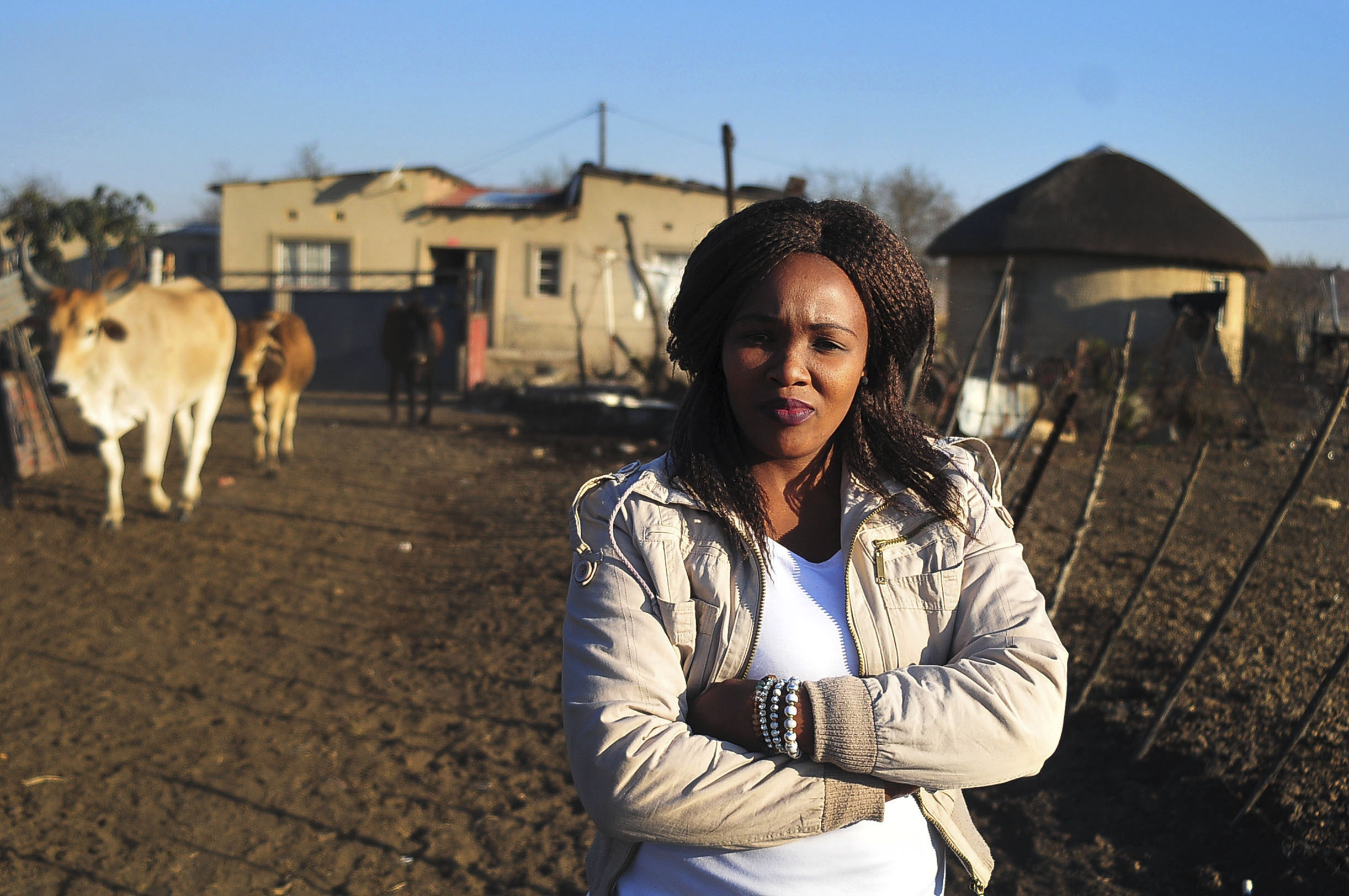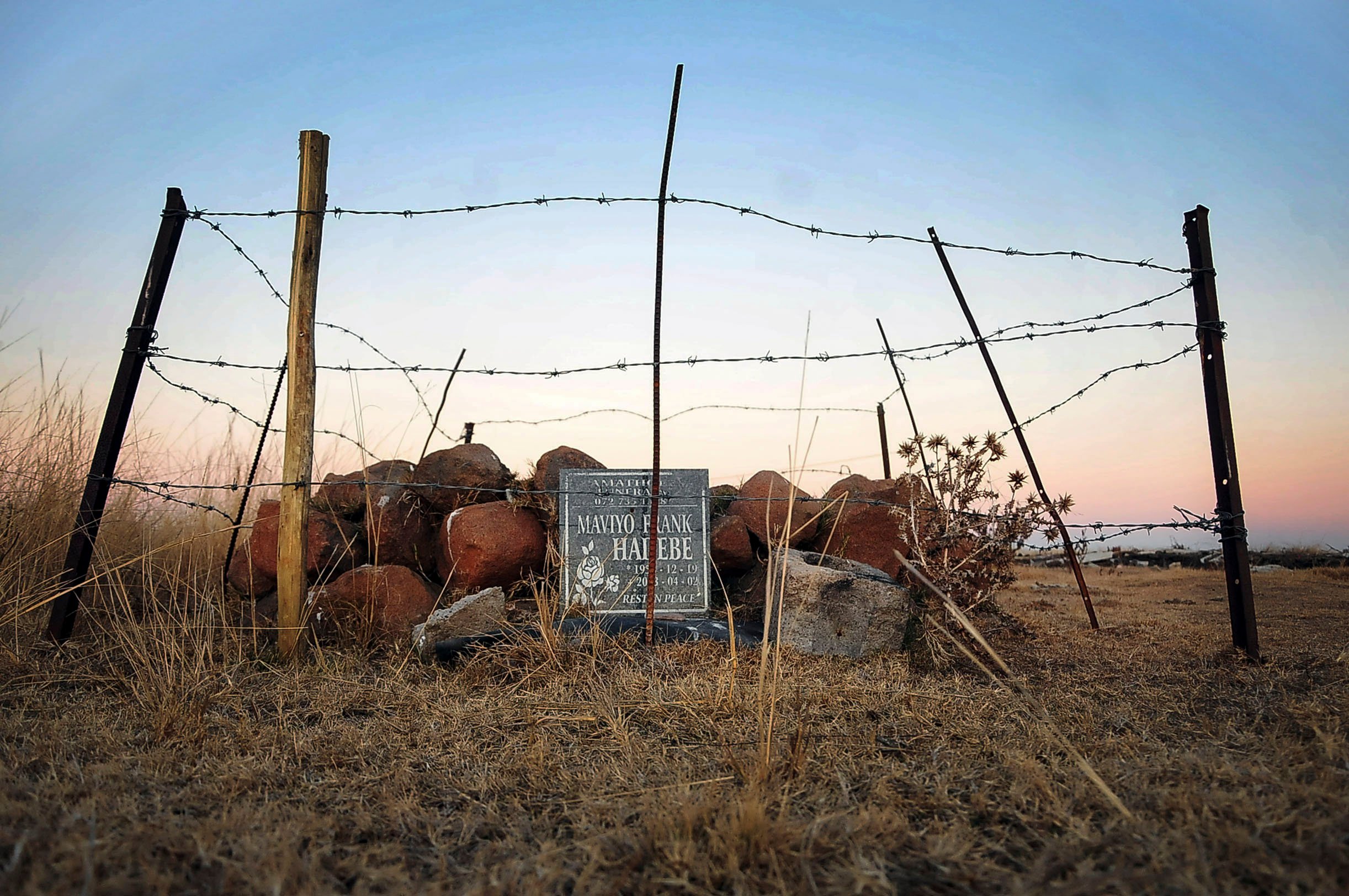Razed: Elizabeth Hadebe stands near the rubble of what used to be her home in Kliprand near Newcastle in KwaZulu-Natal. (Lucas Ledwaba/Mukurukuru Media)
It could well have been 1960 but it wasn’t. It was March 2018 as Dudu Hadebe watched in horror as bulldozers, under the watch of police officers, reduced her home to rubble in a scene reminiscent of the dark days of apartheid’s forced removals.
The five houses the family had built in the 40 years they had lived on the farm Kliprand, halfway between Newcastle and Dundee in KwaZulu-Natal, were flattened to make way for coal mining operations. In a matter of minutes, a family that had once lived off the land was rendered homeless.
“We were left with nothing,” said Hadebe recently, after attending a meeting between lawyers, government and mining company officials in nearby Dannhauser.
She recalled how, before the roaring machines began attacking her homestead, workers in red overalls pounced on the houses with vigour, removing clothing, furniture and groceries and dumping them on the back of bakkies.
 Devastated: After watching her home being demolished, Dudu Hadebe now lives in a small room with her husband and four of their children on the outskirts of Newcastle. (Lucas Ledwaba/Mukurukuru Media)
Devastated: After watching her home being demolished, Dudu Hadebe now lives in a small room with her husband and four of their children on the outskirts of Newcastle. (Lucas Ledwaba/Mukurukuru Media)
When they were done, a family’s history lay in ruins, its dignity in tatters. It’s a deep trauma from which she and her children have not recovered. Only memories of years of living off the land and rearing cattle that helped to put three children through university remained.
The coal deposits beneath the earth have cursed yet another community. A new lord, Ikwezi Mining, now reigns over the land.
The chatter of children running in the pastures where herds of cattle once grazed has now been replaced by the roar of trucks.
The families lived on open plots, living a largely self-sustaining and relatively safe life. But now Hadebe and the families who once called this place home have been reduced to strangers who have to follow a long process of filling in security logbooks and being scrutinised by guards before they can visit their family graves.
The Kliprand community’s plight is one faced by thousands of others, not only in South Africa but across the world, where companies that pursue mineral exploration force people off their land.
 Thembekile Ngwenya, whose family has lived in Kliprand for more than 40 years, lives with the constant worry that their homestead will be demolished to make way for mining. (Lucas Ledwaba/Mukurukuru Media)
Thembekile Ngwenya, whose family has lived in Kliprand for more than 40 years, lives with the constant worry that their homestead will be demolished to make way for mining. (Lucas Ledwaba/Mukurukuru Media)
The Human Rights and Business Dilemmas Forum, an online platform that examines the difficulties facing businesses and people in a bid to prevent and mitigate human rights violations, says resettling people means more than just replacing their homes. This is why giving them financial compensation is not always a straightforward solution.
The forum is a joint initiative between the United Nations Global Compact and the British-based global risk and strategic consulting firm Verisk Maplecroft.
It notes: “Resettling communities means that residents may lose land on which their families and ancestors have lived for centuries. It is land which has provided the conditions to support the residents’ livelihoods for many years. Their social life is situated among their neighbours. Children have grown up to go to the community school. Some groups, particularly indigenous groups, may attach spiritual or religious meaning to the land.”
Early on Friday evening, after waiting more than half an hour for security guards to grant the families access to the graves, Elizabeth Hadebe stood near the heap of rubble that was once her home.
Tears shone in her eyes. Then she looked into the distance, where trucks that ferry coal were lined up facing the opposite direction.
Further to the left of the trucks, conveyor belts towered above the flat landscape. Men in blue overalls and white hard hats milled about the structures. Her cattle will never graze here, and she’ll never watch her grandchildren chase rabbits in the tall grass again.
“I don’t even want to look at this,” she said, turning away from the scene where 40 years of memories now lie in ruins.
 The grave of Maviyo Hadebe, who died in 2013, is among those earmarked for exhumation by Ikwezi Mining. (Lucas Ledwaba/Mukurukuru Media)
The grave of Maviyo Hadebe, who died in 2013, is among those earmarked for exhumation by Ikwezi Mining. (Lucas Ledwaba/Mukurukuru Media)
The grave of her husband, Maviyo Hadebe, is fenced off a little further down from the rubble. He succumbed to illness in 2013. Now his grave is among many of those earmarked for exhumation and relocation. The whole idea fills Elizabeth with dread. The entire Kliprand community is horrified.
The residents, steeped in the deep cultural and spiritual beliefs of the Nguni people, do not regard graves as mere sites where bones lie resting. These represent something deeper, a connection to the land and the spiritual world from where departed ancestors continue to guide and protect.
“If you dig up a grave and remove the remains, you are committing witchcraft,” said Lucky Shabalala, an activist with Sisonke, an environmental and land rights nongovernmental organisation operating in the coal belt of KwaZulu-Natal. “Our customs don’t agree with that. You cannot dig up a grave. We have never seen a dead person being exhumed. But the mine will go ahead because they have the power,” he said.
Shabalala claims the government has failed the Kliprand community and abandoned it to the mercy of mining companies.
Dudu Hadebe now rents a small room for R800 a month on the outskirts of Newcastle. She lives there with her husband and four of their seven children, with no privacy.
The family’s 38 cattle still roam the land in Kliprand, but most of it is fenced off and the grazing that remains is inadequate. The cattle’s condition has deteriorated, making it difficult to sell them at auctions as Dudu used to. For years, the family relied on trading their cattle to pay school fees. One of their children is a university graduate and two others are still studying. But now their source of income is threatened.
Funani Ngwenya’s homestead, comprising nine houses of varying designs and sizes with more 20 rooms, stands near the newly erected fence. The family is living on borrowed time. They, too, face possible eviction.
The family of more than 30, including his children and grandchildren, keep large herds of cattle, as well as goats and poultry. It’s been their way of life since they settled here in 1978. Funani is reluctant to discuss the situation.
His daughter, Thembekile Ngwenya, is worried about the safety of the children who kick about a ball made of rags in the dusty street, as dangerous trucks roar past the homestead.
Some of the Hadebe children have been living with the Ngwenya family since the Hadebe home was demolished in March. Thembekile said the destruction of the homesteads also destroyed the spirit of this close-knit community.
Residents accuse Ikwezi of using bullying and underhanded tactics, and failing to follow proper consultation procedures before it demolished homes and moved into Kliprand.
The affected families have now enlisted the services of lawyers from the Socio-Economic Rights Institute of South Africa (Seri).
Zamantungwa Khumalo, a lawyer with Seri, says although Ikwezi was granted a court order to relocate the families in December 2017, the families — who were then represented by a lawyer appointed by the department of rural development and land affairs — denied that they had given consent for their homes to be demolished.
Khumalo said Seri was informed in February this year that an order for relocation had been granted against the community. But when they consulted with residents, they denied ever having agreed to this.
“The community’s dignity has been impaired. There has been a lack of adequate consultation by the mining company,” said Khumalo.
Ikwezi’s Duan de Villiers insists the affected families were relocated in accordance with an agreement reached between the parties, which was made an order of court on December 13 2017.
He said the relocation of families in March and April 2018 was done under the supervision of the sheriff of the court, in terms of the court order as well as in the presence of the police.
De Villiers denied that Ikwezi failed to properly consult residents, who claim that although meetings may have been held between the company representatives and some people, the Kliprand community as a whole wasn’t represented.
Dudu points out that when the sheriff arrived with the eviction order a day before the bulldozers moved in, they did not recognise any of the names of the people on the court order. The families refused to sign the order, after which the messenger placed it under a rock and left. The next morning, the Kliprand community awoke to the roar of bulldozers.
Thembinkosi Dlamini, the director of Oxfam South Africa, which helped to organise legal representation for the Kliprand families after learning of their plight, described the situation faced by people living in rural KwaZulu-Natal and Mpumalanga as “very bad”.
“Unfortunately, the [mining-] affected villages are remote and not organised and [are] characterised by low levels of education and awareness of their rights. The fact that the affected families are informal land rights holders or labour tenants makes things even more difficult,” said Dlamini.
He said once landowners sold to mining companies, the tenants are then left in peril.
“Mining houses are then quick to declare the residents unlawful occupiers and forcefully move them off the land without consultation. This is not correct, because the rights to free, prior and informed consent apply to individuals and households, no matter what form of attachment they have to the land in question. There is no requirement that a person affected by a project [must] prove ownership. As long as they are going to be impacted [on] by the project, the rights attach,” said Dlamini.
Khumalo warned that mining companies have to understand and respect that black communities function in their own particular way. “When a consultation takes place, it is usually communal. Everyone has to be present. When the men are not around, a consultation cannot take place. The extended family needs to be called if the graveyards need to be relocated. Mining companies have to understand the way people live.”
De Villiers said Ikwezi is in discussions with the affected families, Seri and senior officials from the department of mineral resources, “who are all committed to finding a long-term solution to the concerns of the community”.
He said the discussions began about two months ago and the parties agreed to work constructively to find a solution before the end of next month. Khumalo confirmed this.
De Villiers said Ikwezi has, to date, not relocated any graves in the mining area and will follow the inclusive consultative process provided for by law. “The process includes thorough consultation with the affected next of kin, and no graves shall be harmed or removed without such thorough consultation having taken place and relevant documentation required by Amafa [the KwaZulu-Natal heritage agency] having been obtained,” he said.
Although the engagements between lawyers for the Kliprand families and Ikwezi may lead to a solution in the long term, it will not change the fact that Elizabeth Hadebe will never be able to return to her home, which has been reduced to rubble.
Nor will it wipe away the trauma Dudu Hadebe and her children endured, watching as their family home was razed to the ground. — Mukurukuru Media